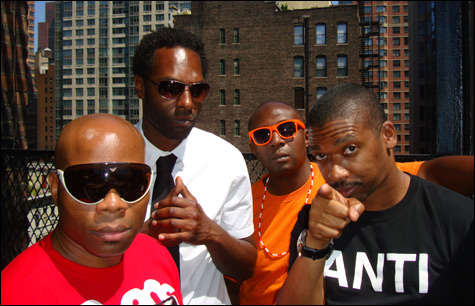
GAME CHANGERS: “We were just trying to see the future ourselves,” says APC’s High Priest (third from left, with MC Beans, M. Sayyid, and Earl Blaize) “and do things that no one had ever done around us.” |
Unlike hip-hop acts that deny bucking convention for the sake of eccentricity, Anti-Pop Consortium were as clear on day zero as they will certainly be at Great Scott next Thursday about their maverick intentions. As their high-school classmate Pharoahe Monch did with Organized Konfusion, the eclectically inclined New York troupe put their profound oxymoronic mission statement right up in the group name.
With a Seinfeld-esque anti-blueprint, APC launched circa 1997 to tweak the game around the time that formulaic sludge was booming. Such inventive teams as the Artifacts and Organized were being purged from major labels, and there was no point in compromising to impress executives. Fading quickly was all hope of pushing complicated urban art on mass audiences. As a result, APC beat chef Earl Blaize plus MCs Beans, High Priest, M. Sayyid, and a basement-full of other Gotham fringe-hop architects fled the grid.
“At the time, we didn’t think about how people would look at us 10 years from then,” says Priest over the phone from New York. “We were just trying to see the future ourselves and do things that no one had ever done around us.” Adds Blaize: “We had influences like Ultramagnetic MCs and Mantronix, but production-wise we were just looking to them for guidance. It wasn’t about making us sound like anybody else.”
Beyond their appetite for odd rhythm and synthetic frequencies, APC also adopted the old alt-rock credo that lyrics need not make sense to anyone but their author (if that, even). Kool Keith and other angel-dust aficionados sparked the figurative revolution that frauds now call “postmodern,” and, in a sense, Wu-Tang’s delusional fiction also rode the unprecedented waves crashing through the five boroughs in the ’90s. But Priest, Sayyid, and Beans brought raw verbosity that especially violated the continuum on which rhymes traditionally fell.
And what of APC cuts that wait till the two-minute mark for verse one to drop, and the group’s seminal glitch-hop efforts? Blaize explains his crew’s approach in simple terms: “This is just what we feel to do. Was like that then and still is this time out.”
APC’s early 12-inch work, subsequent 2000 classic Tragic Epilogue (on Dan the Automator’s 75 Ark imprint), and 2002 Warp release, Arrhythmia, found hysterical recipients beyond critical circle jerks. The group toured with DJ Shadow and Radiohead, developing an overseas following comparable to that of such harder acts as M.O.P. and Gang Starr. “Everybody thinks our music is specific to them,” says Priest. “In France, they ask us how people in the States respond to our stuff.”
Shortly after finishing the 2001 Amnesiac tour with Radiohead, APC made their first cliché move ever, citing creative differences and disbanding. But the following years spent harvesting experimental side and solo projects gave way to a triumphant reunion. On their comeback full-length, Fluorescent Black (due October 13 from Big Dada), the Anti-Pop operatives reveal both their most polished and their least refined antics yet. So, what will follow in their trendsetting wake this time?